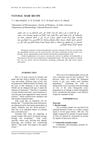 November 2023 in “Current Dermatology Reports”
November 2023 in “Current Dermatology Reports” Oral minoxidil is effective for various hair loss types and may improve male sexual function, but aspirin can reduce its effectiveness.
 October 2023 in “Journal of Preventive Diagnostic and Treatment Strategies in Medicine”
October 2023 in “Journal of Preventive Diagnostic and Treatment Strategies in Medicine” Low ferritin and Vitamin D levels may cause hair loss after COVID-19.
 September 2023 in “Nature Communications”
September 2023 in “Nature Communications” Rare genetic variants in five specific genes are linked to male-pattern hair loss but only account for a small part of the risk.
 August 2023 in “Stem Cell Research & Therapy”
August 2023 in “Stem Cell Research & Therapy” A substance called Cell-free fat extract can effectively treat common hair loss by increasing hair growth and density.

New treatments for hair loss should target eight main causes and use specific plant compounds and peptides for better results.
 January 2023 in “Annals of Dermatology”
January 2023 in “Annals of Dermatology” Men with a family history of hair loss on their mother's side are more likely to have female pattern hair loss.
 October 2021 in “Research Square (Research Square)”
October 2021 in “Research Square (Research Square)” Hair follicle stem cells in hairpoor mice are disrupted, causing hair loss.
 January 2015 in “Journal of clinical & experimental dermatology research”
January 2015 in “Journal of clinical & experimental dermatology research” A protein combining parathyroid hormone and collagen helped hair regrow in mice with a hair loss condition.
September 2022 in “International Journal of Trichology” Trichoscopic measurements help determine the severity of female pattern hair loss.
January 2022 in “Aesthetic surgery journal” Extracellular vesicles may effectively treat hair loss with minimal side effects.
January 2010 in “Springer eBooks”  143 citations,
October 1996 in “Dermatologic Clinics”
143 citations,
October 1996 in “Dermatologic Clinics” Too much androgen can cause hair loss; finasteride may help.
 30 citations,
May 2018 in “Experimental Dermatology”
30 citations,
May 2018 in “Experimental Dermatology” The conclusion is that future hair loss treatments should target the root causes of hair thinning, not just promote hair growth.
20 citations,
October 2017 in “Stem Cell Reports” Alkaline Ceramidase 1 prevents early hair loss in mice by keeping hair follicle stem cells balanced.
 19 citations,
July 2015 in “Journal of Ginseng Research”
19 citations,
July 2015 in “Journal of Ginseng Research” Korean Red Ginseng may protect against hair loss caused by chemotherapy.
 7 citations,
July 2019 in “International Journal of Molecular Sciences”
7 citations,
July 2019 in “International Journal of Molecular Sciences” PGA-4HGF may help treat hair loss by activating hair growth pathways and extending the hair growth phase.
 5 citations,
January 2021 in “Biomedicine & Pharmacotherapy”
5 citations,
January 2021 in “Biomedicine & Pharmacotherapy” Policosanol helps treat hair loss by balancing hormones and supporting hair growth.
 2 citations,
December 2004 in “Medicine”
2 citations,
December 2004 in “Medicine” Different hair and scalp disorders cause hair loss or excess hair growth, with various treatments available depending on the specific condition.
 1 citations,
October 2021 in “Gene, cell and tissue”
1 citations,
October 2021 in “Gene, cell and tissue” Grape sap may help reduce hair loss and promote hair growth in rats.
January 2025 in “Molecules” Caffeine may help with hair loss, but more research is needed to confirm its effectiveness.
 November 2024 in “Research Square (Research Square)”
November 2024 in “Research Square (Research Square)” Lipids may help treat hair loss by promoting hair growth through the HIF-1 pathway.
 May 2024 in “Clinical Cosmetic and Investigational Dermatology”
May 2024 in “Clinical Cosmetic and Investigational Dermatology” Manipulating cell cleanup processes could help treat hair loss.
 June 2004 in “Bulletin of Pharmaceutical Sciences. Assiut University”
June 2004 in “Bulletin of Pharmaceutical Sciences. Assiut University” The natural hair treatment with Cantharidin works best for hair loss.
 37 citations,
March 2014 in “Journal of Trace Elements in Medicine and Biology”
37 citations,
March 2014 in “Journal of Trace Elements in Medicine and Biology” Lower hair zinc and copper levels found in Turkish males with hair loss; higher BMI linked to less hair zinc.
 37 citations,
February 2014 in “Journal of Dermatology”
37 citations,
February 2014 in “Journal of Dermatology” Valproic acid increases hair count in men with hair loss.
 32 citations,
December 2013 in “Biological & Pharmaceutical Bulletin”
32 citations,
December 2013 in “Biological & Pharmaceutical Bulletin” Rice bran extract can potentially treat hair loss by promoting hair growth and increasing the number of hair follicles.
 31 citations,
February 2014 in “Journal of dermatological science”
31 citations,
February 2014 in “Journal of dermatological science” Placental growth factor may help treat hair loss.
29 citations,
March 2014 in “PloS one” Astragaloside IV may help prevent hair loss by blocking a specific pathway that leads to cell death.
 28 citations,
November 2013 in “The journal of investigative dermatology/Journal of investigative dermatology”
28 citations,
November 2013 in “The journal of investigative dermatology/Journal of investigative dermatology” GMG-43AC may help reduce unwanted hair growth and treat certain hair loss conditions.
 20 citations,
April 2014 in “Dermatologic Therapy”
20 citations,
April 2014 in “Dermatologic Therapy” Sulfotransferase in hair follicles helps predict how well minoxidil works for female hair loss.
























